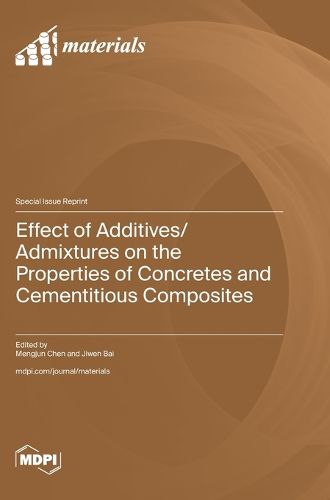Readings Newsletter
Become a Readings Member to make your shopping experience even easier.
Sign in or sign up for free!
You’re not far away from qualifying for FREE standard shipping within Australia
You’ve qualified for FREE standard shipping within Australia
The cart is loading…






This title is printed to order. This book may have been self-published. If so, we cannot guarantee the quality of the content. In the main most books will have gone through the editing process however some may not. We therefore suggest that you be aware of this before ordering this book. If in doubt check either the author or publisher’s details as we are unable to accept any returns unless they are faulty. Please contact us if you have any questions.
In today's cement and concrete industry, chemical admixtures have become one of the essential components of cement-based materials. The addition of a certain amount of chemical admixture to cement concrete can improve the defects of the cementitious material itself or improve the performance of the cementitious material. There is a wide range of chemical admixtures in cement concrete, such as water-reducing agents, retarders, early strength agents, accelerators, quick setting agents, air-entraining agents, etc. However, regardless of the admixture added to achieve a particular effect, the addition of admixture will affect the cement hydration process. With the high performance of cement and concrete and the wide application of various chemical admixtures and mineral admixtures, the systematic study of the effect of various admixtures on cement hydration is of great theoretical and engineering significance in terms of understanding the interaction between different chemical admixtures and cement and regulating the hydration process of cement.
This Special Issue brings together the latest developments in the field of concrete admixtures. Articles in this Special Issue cover a variety of topics including but not limited to the preparation of new concrete admixtures, alkali-activated material admixtures, and high-performance composite admixtures.
$9.00 standard shipping within Australia
FREE standard shipping within Australia for orders over $100.00
Express & International shipping calculated at checkout
This title is printed to order. This book may have been self-published. If so, we cannot guarantee the quality of the content. In the main most books will have gone through the editing process however some may not. We therefore suggest that you be aware of this before ordering this book. If in doubt check either the author or publisher’s details as we are unable to accept any returns unless they are faulty. Please contact us if you have any questions.
In today's cement and concrete industry, chemical admixtures have become one of the essential components of cement-based materials. The addition of a certain amount of chemical admixture to cement concrete can improve the defects of the cementitious material itself or improve the performance of the cementitious material. There is a wide range of chemical admixtures in cement concrete, such as water-reducing agents, retarders, early strength agents, accelerators, quick setting agents, air-entraining agents, etc. However, regardless of the admixture added to achieve a particular effect, the addition of admixture will affect the cement hydration process. With the high performance of cement and concrete and the wide application of various chemical admixtures and mineral admixtures, the systematic study of the effect of various admixtures on cement hydration is of great theoretical and engineering significance in terms of understanding the interaction between different chemical admixtures and cement and regulating the hydration process of cement.
This Special Issue brings together the latest developments in the field of concrete admixtures. Articles in this Special Issue cover a variety of topics including but not limited to the preparation of new concrete admixtures, alkali-activated material admixtures, and high-performance composite admixtures.